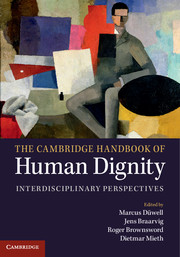Book contents
- Frontmatter
- Contents
- List of contributors
- Foreword
- Why a handbook on human dignity?
- Acknowledgments
- 1 Human dignity from a legal perspective
- 2 Human dignity: concepts, discussions, philosophical perspectives
- Part I Origins of the concept in European history
- Part II Beyond the scope of the European tradition
- Part III Systematic conceptualization
- Part IV Legal implementation
- Part V Conflicts and violence
- Part VI Contexts of justice
- Part VII Biology and bioethics
- 57 The threefold challenge of Darwinism to an ethics of human dignity
- 58 On the border of life and death: human dignity and bioethics
- 59 Human dignity and commodification in bioethics
- 60 Dignity only for humans? A controversy
- 61 Dignity only for humans? On the dignity and inherent value of non-human beings
- 62 Human dignity and future generations
- Appendix 1 Further reading
- Appendix 2 Universal Declaration of Human Rights
- Index
- References
62 - Human dignity and future generations
from Part VII - Biology and bioethics
Published online by Cambridge University Press: 05 March 2015
- Frontmatter
- Contents
- List of contributors
- Foreword
- Why a handbook on human dignity?
- Acknowledgments
- 1 Human dignity from a legal perspective
- 2 Human dignity: concepts, discussions, philosophical perspectives
- Part I Origins of the concept in European history
- Part II Beyond the scope of the European tradition
- Part III Systematic conceptualization
- Part IV Legal implementation
- Part V Conflicts and violence
- Part VI Contexts of justice
- Part VII Biology and bioethics
- 57 The threefold challenge of Darwinism to an ethics of human dignity
- 58 On the border of life and death: human dignity and bioethics
- 59 Human dignity and commodification in bioethics
- 60 Dignity only for humans? A controversy
- 61 Dignity only for humans? On the dignity and inherent value of non-human beings
- 62 Human dignity and future generations
- Appendix 1 Further reading
- Appendix 2 Universal Declaration of Human Rights
- Index
- References
Summary
The questions of whether we have obligations towards future generations, why we have such obligations and what these obligations entail, are important topics of discussion in contemporary moral and political philosophy. While there seems to be political consensus on the view that we are obligated to adopt a policy of sustainability, the reasons why we should endorse such an obligation are highly contested. The dominant argument can be found in the so-called ‘Brundtland definition’ of ‘sustainable development’: ‘sustainable development is development that meets the needs of the present without compromising the ability of future generations to meet their own needs’ (United Nations 1987: 37). In this line of thought, the obligation towards future generations is a normative reason for a sustainable politics. Of course, we also have reasons to act sustainably because of the rights of current (particularly the younger) generations, but various aspects of a sustainable politics are only necessary if we take future generations into account. Such an obligation to a long-term sustainable policy would assume that there is something about future generations that gives us obligations towards them. But if we attribute rights to future generations, we would assume that human rights should be attributed to beings that do not and may never exist. This problem is quite extensively discussed in terms of ‘rights of future generations’ or ‘intergenerational justice’ (for example, Grosseries and Meyer 2009; Hiskes 2009) but the concept of human dignity is hardly ever referred to. In the following I will briefly explain (1) the obstacles we are facing if we talk about human dignity in the context of future generations; (2) what such a conceptualization could look like; and (3) what further philosophical and practical issues arise from this.
Why should we talk about human dignity in the context of future generations?
In providing a normative framework for obligations towards future generations we have basically two options.
- Type
- Chapter
- Information
- The Cambridge Handbook of Human DignityInterdisciplinary Perspectives, pp. 551 - 558Publisher: Cambridge University PressPrint publication year: 2014
References
- 3
- Cited by

